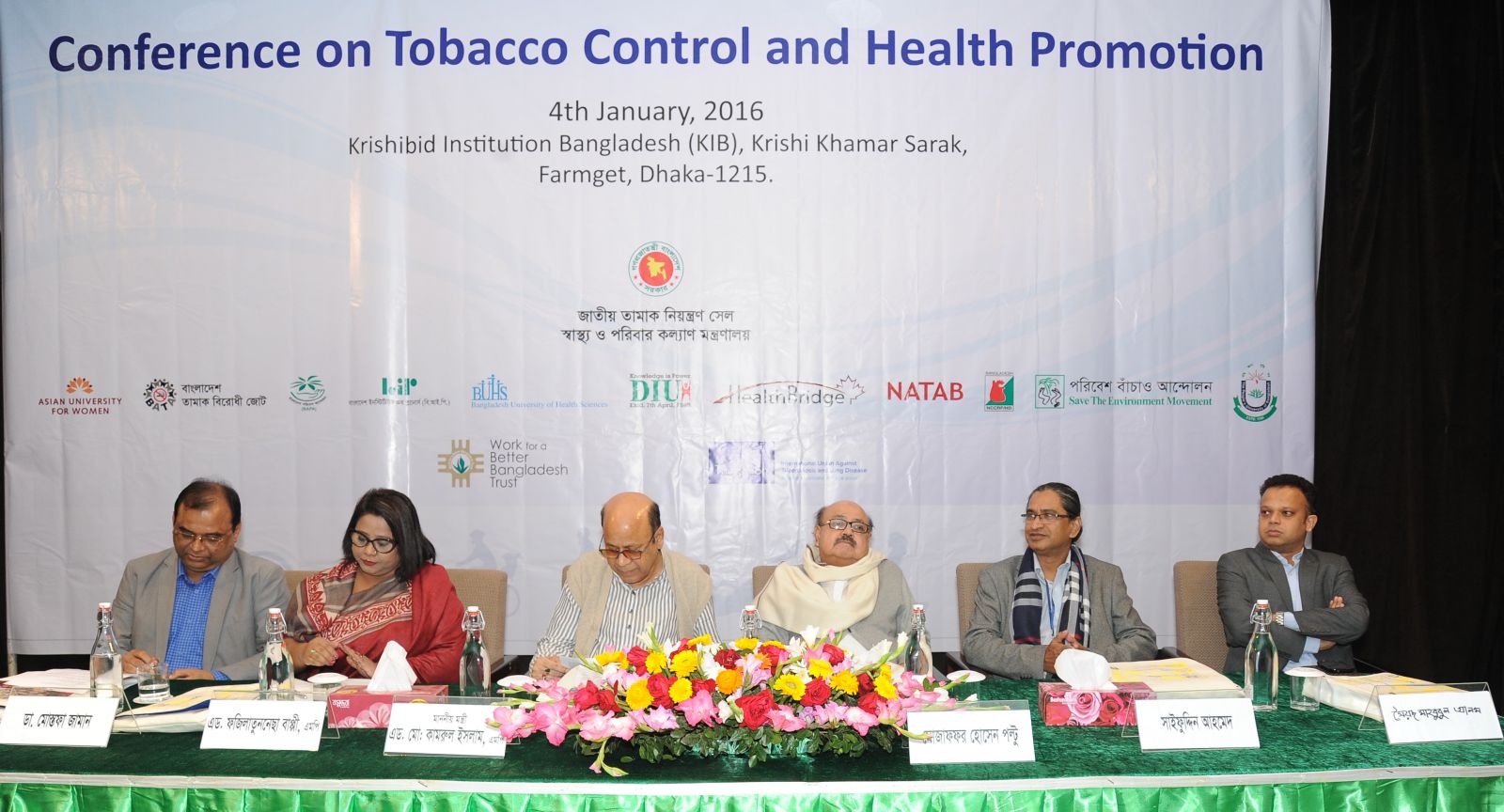

As the chief guest of the closing ceremony, Food Minister Md. Kamrul Islam MP said, although tobacco companies are powerful, the present government led by Prime Minister will work uncompromisingly for tobacco control and NCD prevention. The controlling step of the risk factors of NCDs, including tobacco products will be continued. However, parents should come forward to protect children from junk food, fast food and soft beverages. We will ensure sports opportunities for children.
Minister also said, the government has passed breakthrough law in the development of public health and food safety. The effective implementation of this act will reduce 90 percent risk of food-borne diseases.
Prominent politician and vice-president of the National Tuberculosis Prevention Association (NATAB) Mozaffar Hossain Poltu said, tobacco companies are trying to do conspiracy to stop graphic health warnings which suppose to be taking in place from 19 March 2016. The government is committed to implement the Tobacco Control Act. So, tobacco companies interference have to be stopped. Graphic health warning has to be ensured on time according to the act.
Ad. Fazilatunnessa MP said, everyone should work together to stop tobacco companies unethical intervention to protect the public health. Even after 16 million people in small country; government succeed to ensure food security. Continue control on unhealthy and harmful food has to maintain to ensure healthy food. It is important to take steps to control tobacco and tobacco products; as well as fast food, junk food, high processed food to protect the public health.
Prof. M Mostafa Zaman, National Professional Officer of WHO said, due to absence of advertising policy to stop advertisement of unhealthy food, companies are promoting different kinds harmful foods by misleading advertisement. The government must take effective measures against this confusing and harmful propaganda of unhealthy food and beverages. People have to encourage for taking healthy food. Farmers need to provide assistance for vegetable and fruit production.
Moreover, Ad. Syed Mahbubul Alam, the technical adviser of The Union gave speech in the closing session chaired by the executive director of WBB Trust Saifuddin Ahmed. The program was moderated by Aminul Islam Sujon, Executive Editor of Swamaswar, anti tobacco newsletter of the Bangladesh Anti Tobacco Alliance (BATA).
In the daylong conference, specialists discussed about healthy diet, healthy environment, inclusive development and sustainable funding for tobacco control and health promotion in four different sessions. About 200 representatives from different organizations of the country participated in the conference. Earlier in the opening session, prominent physician Dr. Pran Gopal Dutt, Roksana Kader, Additional Secretary of Ministry of Health and Family Welfare, Professor Dr. Liyakot Ali, Vice chancellor of Bangladesh University of Health Sciences gave speeches.
Prof. Pran Gopal Dutt said, smoking causes various non-communicable diseases including cancer, heart disease and stroke. Tobacco control activities have to strengthen to prevent multi-lateral damage due to tobacco. Other harmful products like junk food, fast food and soft beverages have to control. In his speech he also highlighted the damaging effect of radiation.
Roxana Quader said that, the government is implementing tobacco control law. According to law, graphic health warning is in a queue, which will cover 50% of tobacco packets. We hope that after this GHW, tobacco consumption will reduce.
Advocate Syed Mahbubul Alam said we have to work together and in a coordinated way on tobacco control and NCD prevention. Professor Liyakat Ali expressed his support in future both in tobacco control and NCD prevention.
Saifuddin Ahmed said that this conference is an opportunity to strengthen the social movement against tobacco. A wide range of people from various profession and platform have actively engaged throughout the conference.
Co-organizers are National Tobacco Control Cell of the Ministry of Health and Family Welfare, Asian University for Women, Bangladesh Anti Tobacco Alliance, Bangladesh Poribesh Andolon, Bangladesh Institute of Planners, Bangladesh University of Health Sciences, Dhaka International University, HealthBridge-Canada, National Tuberculosis Prevention Association (NATAB), National Center for Control of Rheumatic Fever and Heart Disease, Paribesh Bachao Andolon, The Peoples University of Bangladesh and International Union Against Tuberculosis and Lung Disease (Union).
Besides opening and closing program, 8 different sessions and one plenary session was organized. About 200 organizations attended at the conference as participants from various parts of country. More than 60 representatives from national and international organizations including eminent public health experts, academia and well-known activists attended in the conference as chair, speaker and presenter at the various sessions. The sessions focus as a whole health promotion and tobacco control, emphasized on the healthy diet, healthy environment, inclusive development and sustainable funding for tobacco control and health promotion.
However, pre-conference workshop held at the WBB Trust office on 3rd January, in which 70 organizations were attended. In pre-workshops, research, advocacy and media advocacy were discussed with the participants.
